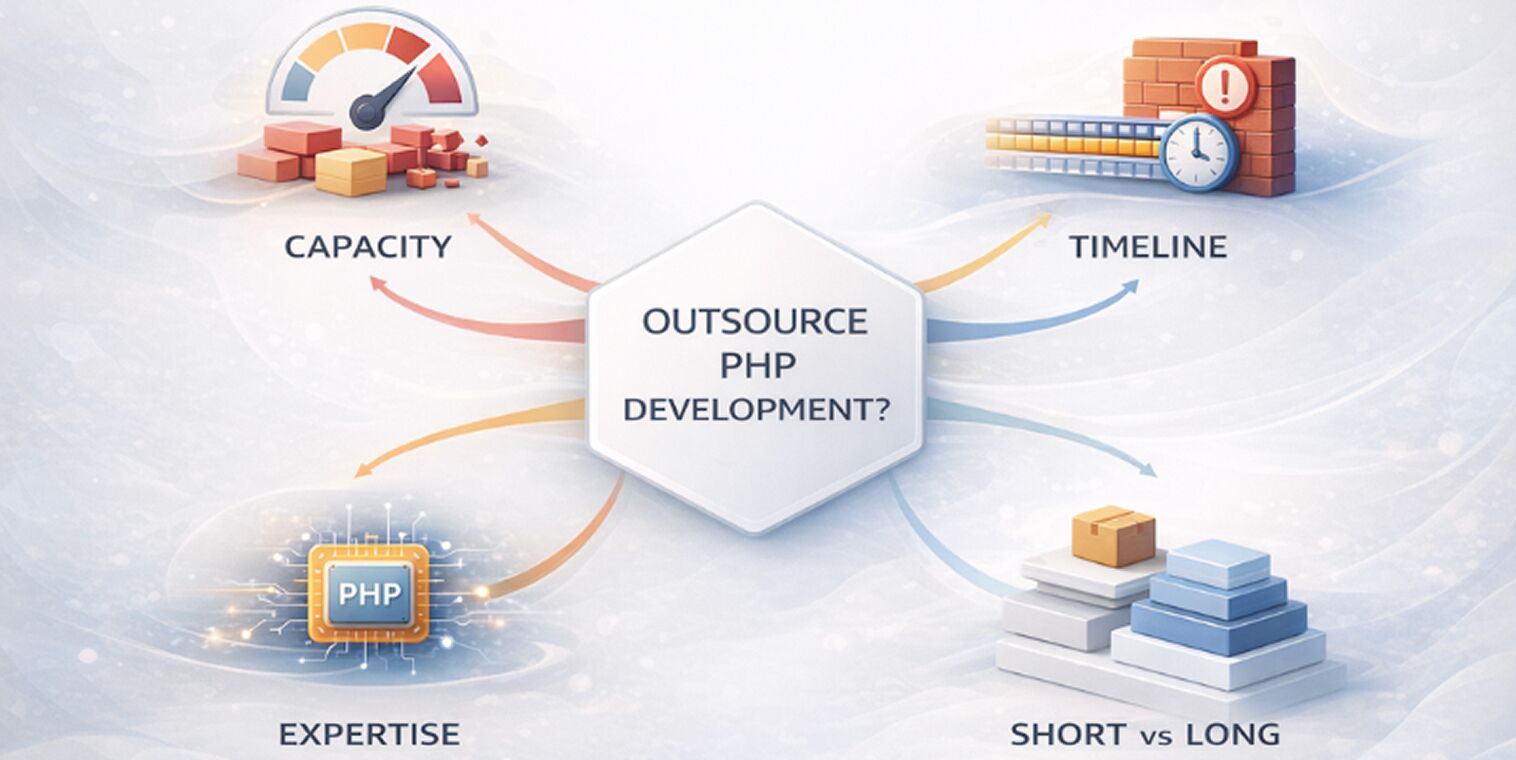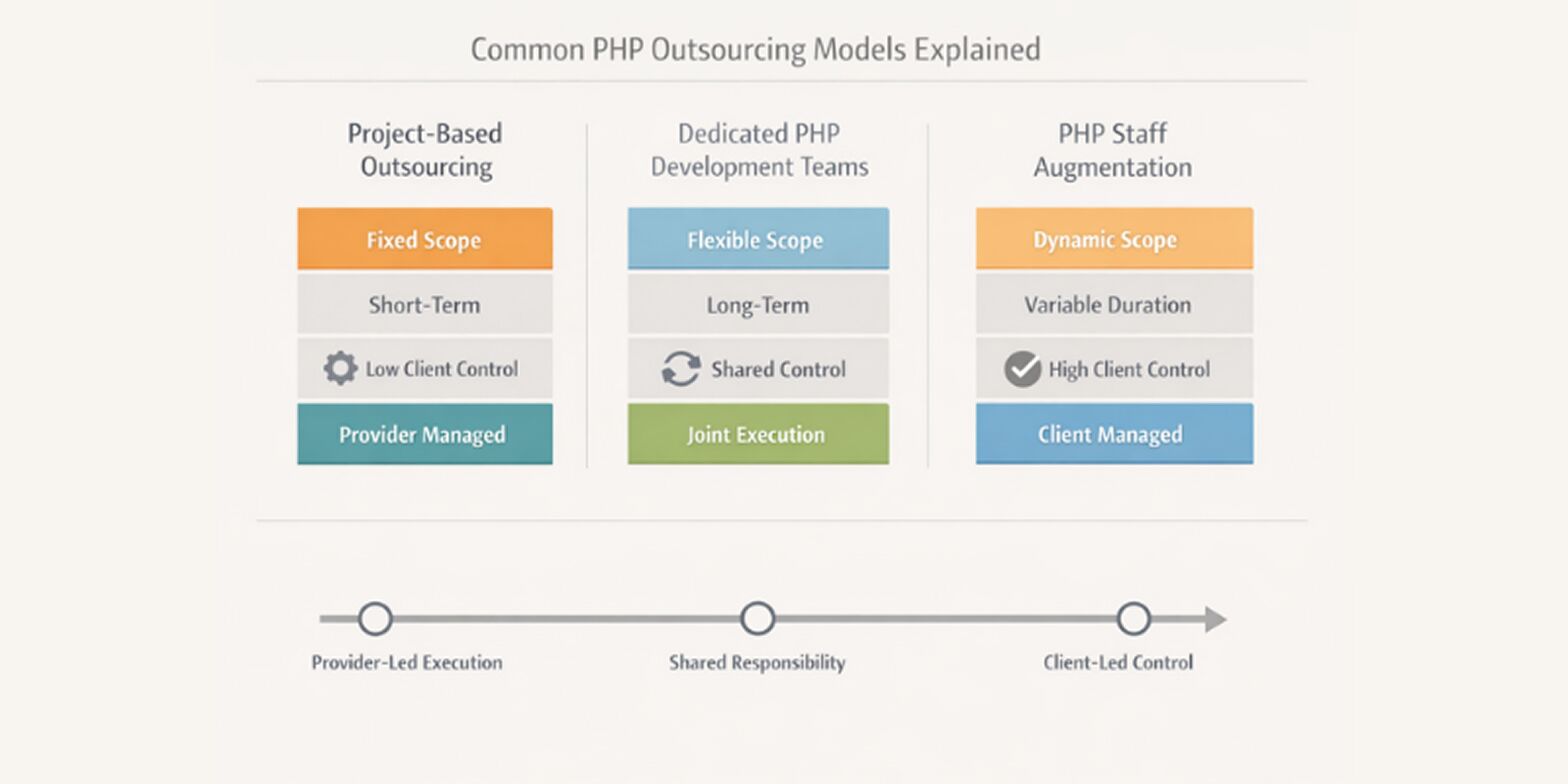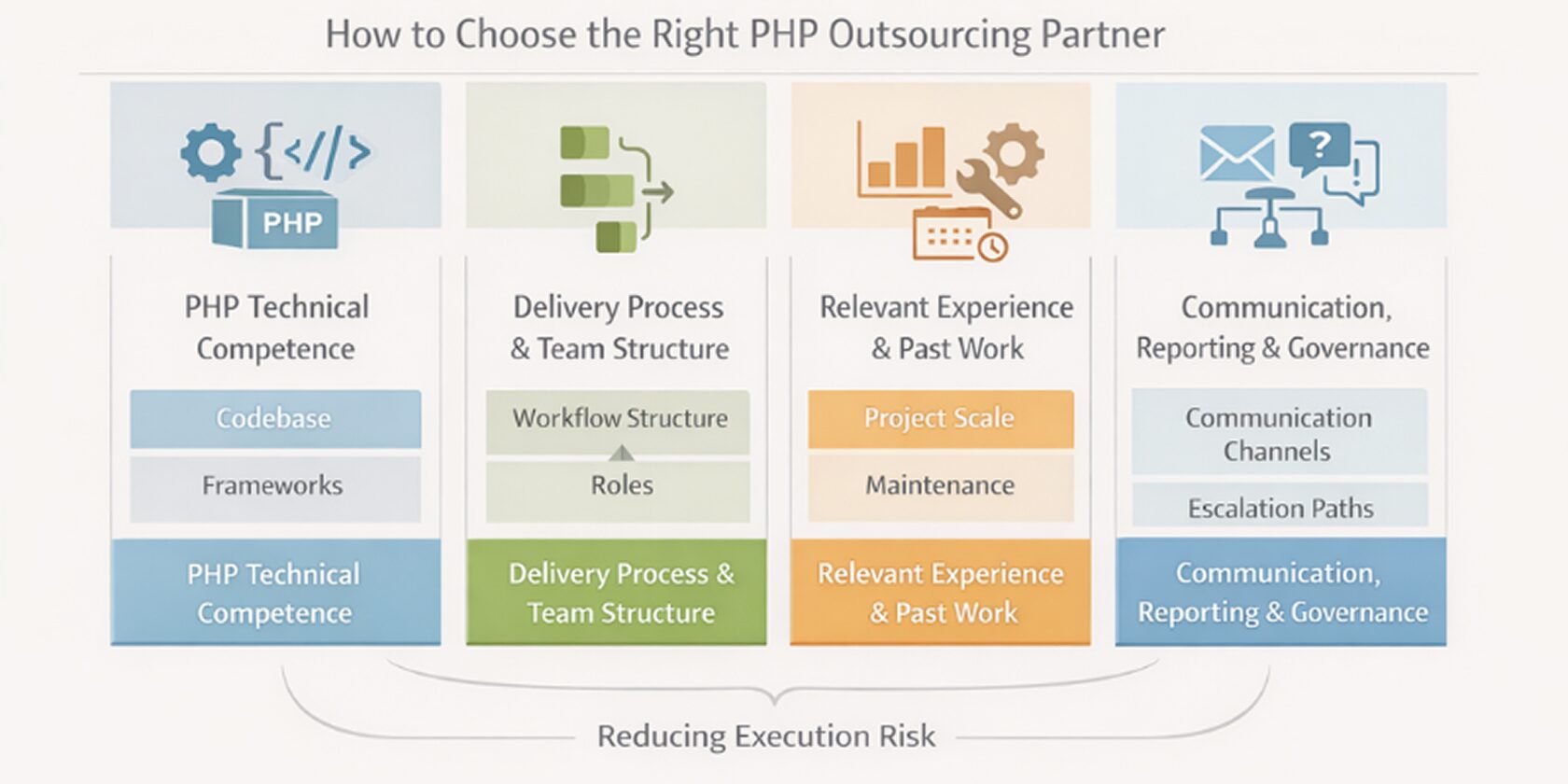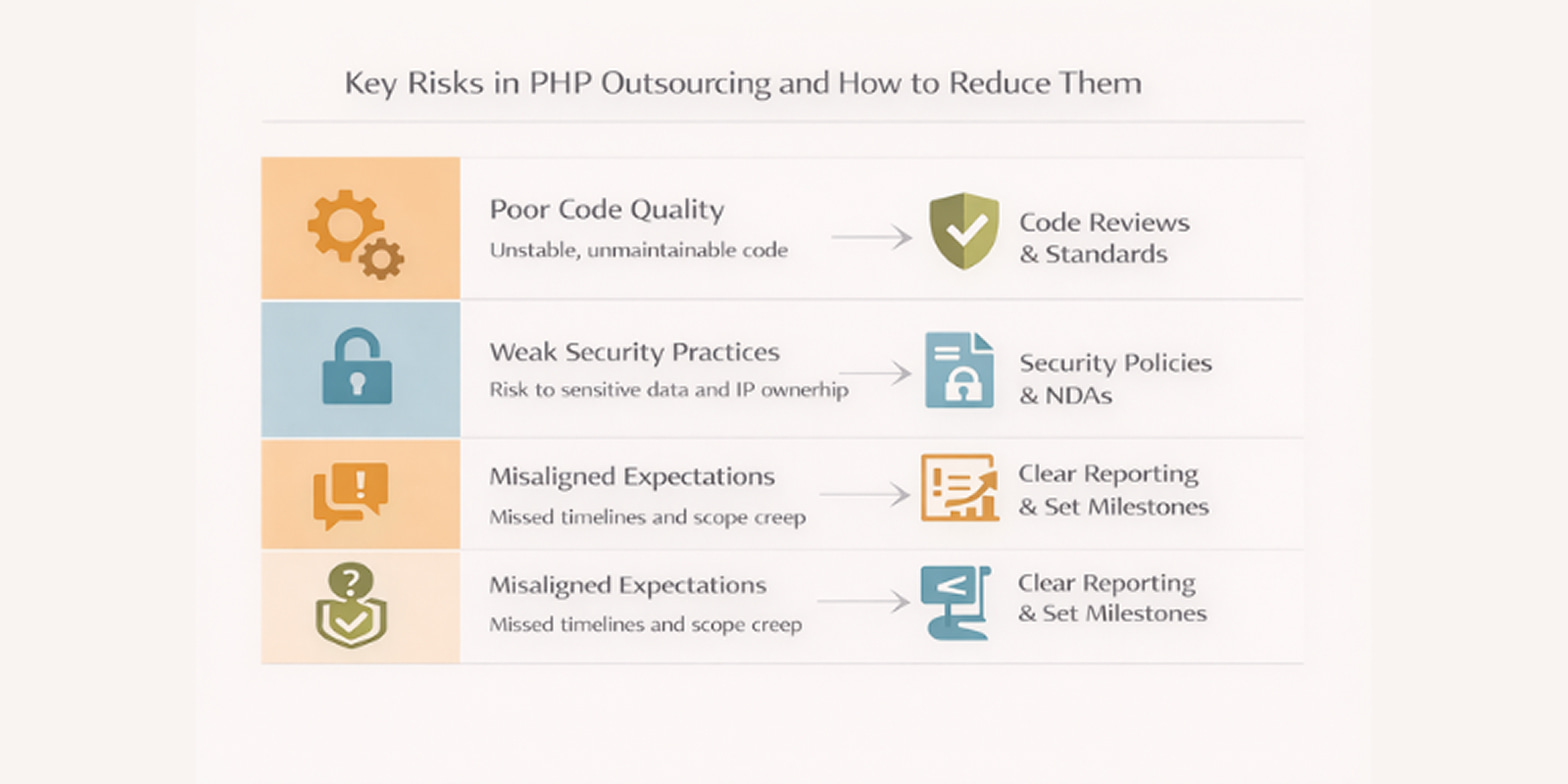A Practical Guide to Outsourcing PHP Development
-1.png)
Outsourcing PHP development is rarely a technical choice. It’s usually driven by delivery pressure, hiring constraints, or the need to move faster without expanding internal teams. When done without a clear structure, however, outsourcing can introduce problems that surface later, like unclear ownership, uneven code quality, and higher long-term maintenance effort.
The scale of this decision is hard to ignore. According to Statista, global IT outsourcing spending has surpassed $430 billion, with application development and maintenance representing a major share of that spend. PHP remains widely used in business-critical systems, which means outsourcing decisions often affect products that must stay reliable and maintainable for years.
This guide focuses on the decisions that separate successful PHP outsourcing from costly rework where ownership is defined, risks emerge, and early choices quietly shape long-term outcomes.
What outsourcing PHP development means in practice
Outsourcing PHP development is often evaluated as a cost or capacity decision, but most issues arise from unclear boundaries rather than technical execution. This section clarifies what outsourcing typically covers, what responsibilities remain internal, and where assumptions tend to break down. Understanding these distinctions early helps teams assess whether this model fits their delivery needs.
What Is included in PHP development outsourcing
In practice, outsourcing PHP development means delegating defined engineering execution to an external team while working against an agreed scope. The outsourced team is responsible for building and maintaining server-side functionality based on documented requirements and technical constraints.
This commonly includes:
- Backend development using PHP and approved frameworks
- Database interactions, business logic, and API development
- Feature implementation tied to specified requirements
- Bug fixes, refactoring, and performance improvements within scope
The outsourced team works within the boundaries set at the start of the engagement. The clarity of those boundaries directly affects delivery consistency and code quality.
What remains the client’s responsibility
Outsourcing does not remove the need for internal ownership. Strategic direction and decision-making remain with the client, even when day-to-day development is handled externally.
Clients are typically responsible for:
- Defining product goals, priorities, and success criteria
- Approving architectural decisions and trade-offs
- Providing timely feedback and clarifications
- Managing roadmap changes and internal alignment
When these responsibilities are delayed or unclear, progress slows regardless of developer experience.
Common misconceptions about outsourcing PHP development
A common misconception is that outsourcing transfers full accountability for outcomes. In reality, it transfers execution, not ownership. Another assumption is that limited involvement leads to faster delivery; in practice, a lack of context often increases rework.
Successful PHP outsourcing depends less on where the team is located and more on how clearly roles, expectations, and decision boundaries are defined before development begins.
When outsourcing PHP development makes sense

Outsourcing PHP development works best when it solves a defined delivery constraint rather than acting as a general staffing substitute. The situations below reflect when outsourcing tends to improve outcomes and when it aligns with how teams operate in practice. This mirrors the common benefits of software outsourcing, where teams extend capacity without expanding long-term headcount or internal overhead.
Capacity and resource constraints
Outsourcing is often appropriate when internal teams are already fully allocated and additional work would slow core initiatives. Maintenance, feature development, and technical debt frequently compete for the same limited resources, creating bottlenecks that internal reallocation cannot resolve quickly.
In these cases, an external PHP team can take on clearly scoped work without forcing trade-offs that impact roadmap commitments.
Project timelines and delivery pressure
Fixed timelines introduce a different set of constraints. Product launches, contractual obligations, or seasonal demand can require faster execution than internal hiring allows.
Outsourcing tends to work well when:
- Delivery dates are fixed and known in advance
- Requirements are stable enough to support parallel development
When scope is relatively clear, external teams can increase throughput without adding long-term headcount.
Access to specialized PHP expertise
Some PHP projects require experience that internal teams may not encounter regularly. This includes legacy system work, framework-specific implementations, or complex integrations.
Outsourcing makes sense here because it allows teams to bring in focused expertise for a defined purpose, rather than stretching internal developers into unfamiliar territory or committing to long-term roles for short-term needs.
Short-term vs long-term development needs
Outsourcing aligns most naturally with short- to medium-term initiatives that have a defined objective. Feature expansions, migrations, or stabilization efforts often benefit from external execution support.
For long-term products that evolve continuously, outsourcing is most effective when internal teams retain ownership and use external resources selectively to support, rather than replace, core development functions.
When you should keep PHP development in-house
Outsourcing is not always the right delivery model. In some situations, keeping PHP development in-house reduces risk, improves alignment, and avoids long-term friction. This section outlines the scenarios where internal teams are often better positioned to deliver consistent results.
Projects requiring deep domain context
Some products depend heavily on business logic, industry knowledge, or historical context that is difficult to transfer. When development decisions are closely tied to nuanced workflows or evolving internal rules, internal teams tend to move faster and make better trade-offs.
In these cases, the cost of onboarding external developers and maintaining context can outweigh the benefits of outsourcing.
High-sensitivity data or compliance constraints
Projects involving sensitive data or strict regulatory requirements often demand tighter control over access, processes, and environments.
This typically applies when:
Data access must be tightly restricted or audited
Compliance requirements affect development workflows
Security policies limit external system exposure
While outsourcing is possible in regulated environments, it usually requires additional overhead that can slow delivery.
Products with constant internal iteration cycles
Products that change frequently based on internal feedback, experimentation, or close collaboration across teams often benefit from in-house development. Rapid iteration relies on shared context, informal communication, and quick decision-making that can be difficult to maintain with external teams.
In these scenarios, internal teams are often better equipped to adapt quickly without introducing coordination delays.
Common PHP outsourcing models explained

Outsourcing PHP development is not a single approach. The engagement model you choose determines how work is planned, how decisions are made, and how much control your team retains.
These structures closely follow standard software outsourcing models used across backend and platform teams. Understanding these models before evaluating cost or vendors helps avoid structural mismatches that can create friction later.
Project-based PHP outsourcing
Project-based outsourcing is used when scope, timelines, and deliverables can be defined in advance. The outsourcing partner is responsible for executing the work and delivering agreed outcomes within a fixed framework.
This model is typically suitable when:
Requirements are stable and unlikely to change frequently
Delivery can be measured against predefined milestones
The project has a clear start and end point
Execution ownership largely sits with the provider, while the client focuses on review and approval.
Dedicated PHP Development Teams
A dedicated team model assigns a group of PHP developers to work exclusively on your product over an extended period. While the team remains employed and managed by the provider, they operate as a long-term extension of your internal team. This setup closely resembles an offshore development center structure used for sustained backend delivery.
This approach works well when:
Development needs are ongoing rather than one-time
Continuity and product familiarity are important
Internal hiring is not feasible or desirable
Clients retain control over priorities and direction, while the provider handles staffing and team operations.
PHP staff augmentation model
Staff augmentation focuses on adding individual PHP developers to an existing internal team. These developers work under the client’s processes, tools, and direct supervision.
This model is commonly chosen when:
Immediate capacity is needed within an established team
Internal workflows and standards are already defined
Daily oversight and close collaboration are required
Control is highest in this model, but it also requires the most internal management effort.
How these models differ in ownership and control
The primary difference between PHP outsourcing models lies in how responsibility is distributed. Project-based outsourcing places more execution ownership with the provider. Staff augmentation keeps most control with the client.
Dedicated teams sit between these approaches, offering long-term continuity with shared responsibility. This model is often used when PHP work is part of broader backend development solutions rather than a standalone project. Selecting the right model depends on how much oversight, flexibility, and internal involvement your team can realistically support.
How to prepare before outsourcing PHP development
Many outsourcing issues stem from gaps that exist before a vendor is ever involved. Preparation sets the foundation for predictable delivery and reduces the risk of misalignment once development begins. This section focuses on the internal work teams should complete to ensure outsourcing supports their goals rather than creating avoidable friction.
Defining scope, outcomes, and success criteria
Clear scope definition is essential before engaging an external PHP team. This does not require exhaustive documentation, but it does require agreement on what will be built and how progress will be evaluated.
At a minimum, teams should clarify:
Core features or components included in the engagement
Expected outcomes and delivery milestones
Criteria used to assess completion and quality
Without shared expectations around scope and success, even well-executed development can miss business objectives.
Setting technical and architectural expectations
Outsourced teams rely on technical boundaries to make sound implementation decisions. Establishing these boundaries early prevents rework and conflicting assumptions.
This typically includes:
Preferred PHP frameworks, versions, and coding standards
Integration points with existing systems or services
Constraints related to performance, security, or deployment environments
When technical expectations are undefined, teams often spend early cycles correcting direction rather than delivering value.
Assigning internal ownership and decision authority
Outsourcing does not eliminate the need for internal leadership. Clear ownership ensures decisions are made consistently and without delay.
Before work begins, teams should identify:
A primary point of contact for technical and product decisions
Decision authority for scope changes or trade-offs
Escalation paths when blockers arise
Defined ownership helps maintain momentum and prevents confusion once development is underway.
How to choose the right PHP outsourcing partner

Choosing a PHP outsourcing partner is less about vendor claims and more about reducing execution risk. At this stage, the focus should be on how a team operates under real constraints, handles trade-offs, and stays reliable once development is underway.
Assessing PHP technical competence
Technical competence is best evaluated through context, not credentials. A capable PHP team should demonstrate experience working with environments similar to yours, including existing codebases and integration-heavy systems.
Here, pointers add clarity because they define concrete evaluation signals:
Familiarity with the PHP versions and frameworks relevant to your stack
Experience maintaining or extending existing applications
Ability to explain technical decisions and trade-offs clearly
Teams that can articulate why they chose certain approaches are usually better prepared to handle complexity than those relying on broad or generic claims.
Evaluating delivery process and team structure
A reliable delivery process often matters more than individual developer skill. Clear workflows reduce dependency on specific people and make progress predictable.
Look for clarity around how work is planned, reviewed, and approved, and how teams respond when priorities shift. Well-structured teams can explain how responsibilities are divided, how continuity is maintained, and how delivery remains consistent even when changes occur.
Reviewing relevant experience and past work
Past work provides insight into how a team approaches challenges similar to yours. Some teams validate fit by reviewing how vendors structure their PHP development solutions and support long-term product maintenance.
The most useful examples are those that reflect comparable scale, complexity, or long-term support requirements.
Relevant experience may include:
Projects with similar technical constraints
Products that required ongoing maintenance or iteration
Work performed under delivery or compliance pressure
The goal is to assess alignment, not volume.
Communication, reporting, and governance alignment
Communication and governance define how smoothly collaboration functions once work begins. Misalignment here often leads to delays and misunderstandings.
Areas worth clarifying include:
How progress is reported and reviewed
Expected response times and communication channels
Escalation paths for technical or delivery issues
When these expectations are clear upfront, teams can operate with autonomy while maintaining transparency.
Cost factors in outsourcing PHP development
Cost is often the first question teams ask when considering PHP outsourcing, but it is rarely the most useful one on its own. Understanding what actually drives cost helps avoid unrealistic expectations and supports better trade-offs between budget, delivery, and long-term maintainability.
What actually drives PHP outsourcing costs
PHP outsourcing costs are shaped by more than hourly rates. The biggest drivers tend to relate to project complexity and the level of coordination required.
Key factors include:
Scope size and stability over time
Complexity of the existing codebase or integrations
Level of testing, documentation, and review required
Degree of ongoing collaboration and oversight
Projects with unclear requirements or frequent changes often cost more in practice, even if the initial rate appears lower.
How engagement models affect budget
The outsourcing model you choose has a direct impact on cost predictability. Project-based engagements often offer clearer short-term pricing but can become less flexible when scope changes. Dedicated teams and staff augmentation typically involve ongoing monthly costs, with budgets influenced by team size and duration rather than fixed deliverables.
For planning purposes, the following ranges reflect typical PHP outsourcing costs by engagement model, not fixed project estimates:
Actual costs vary based on scope stability, codebase complexity, collaboration requirements, and quality expectations, which often matter more than the model itself.
Regional cost differences at a high level
Regional differences influence pricing, but they should be viewed as part of a broader cost equation. Lower rates in certain regions can reduce short-term spending, but time zone alignment, communication overhead, and quality consistency also affect total cost.
At a high level, regional pricing varies due to:
Local labor markets and operating costs
Availability of experienced PHP developers
Overhead required to support collaboration across time zones
Evaluating regional cost differences without considering these factors can lead to misleading comparisons.
Balancing cost with quality and risk
The lowest-cost option is rarely the lowest-risk option. Decisions based solely on price often result in higher downstream costs through rework, delays, or long-term maintenance challenges.
Balancing cost with quality means assessing how pricing aligns with delivery reliability, technical competence, and the level of oversight required. Teams that factor risk into cost decisions tend to make more sustainable outsourcing choices.
Key risks in PHP outsourcing and how to reduce them

Outsourcing PHP development introduces risks that differ from in-house delivery, but most of them are predictable and manageable. The objective is not to eliminate risk entirely, but to identify where problems typically arise and how early structure helps reduce their impact over time.
Code quality and maintainability risk
Code quality issues rarely appear immediately. They tend to surface gradually through inconsistent patterns, limited documentation, or shortcuts taken to meet delivery pressure. Over time, this increases maintenance effort and slows future development.
This risk is highest when coding standards, review practices, and long-term maintainability expectations are not clearly defined upfront. Reducing it requires early alignment on quality benchmarks and regular review cycles that prioritize consistency, not just feature completion.
Security, data access, and intellectual property risk
Security and intellectual property concerns usually stem from unclear boundaries rather than malicious intent. External teams often need access to repositories, environments, or data, which increases exposure if controls are loosely defined.
This risk is reduced by clearly establishing:
Data access levels and environment separation
Ownership of source code and deliverables
Security practices expected during development
Clear access controls and explicit IP terms protect both operational security and legal ownership.
Knowledge dependency and continuity risk
Knowledge dependency occurs when critical understanding of the system is concentrated within a small number of external developers. This becomes a risk if team members rotate or the engagement ends unexpectedly.
Continuity challenges often arise when:
Documentation is minimal or outdated
Context is shared informally rather than recorded
Knowledge transfer is deferred until the end
Treating knowledge sharing as an ongoing responsibility reduces dependency and supports long-term maintainability.
Communication and expectation alignment risk
Misaligned communication is one of the most common causes of outsourcing friction. Differences in assumptions, response expectations, or feedback timing can lead to delays and rework even when technical execution is sound.
This risk is reduced when the communication structure is explicit about how progress is reported, how feedback is exchanged, and how unresolved issues are escalated. Clear expectations help collaboration remain steady instead of reactive.
Scope drift and change management risk
Scope drift is a frequent source of cost overruns and frustration. It often occurs when requirements evolve without a shared process for evaluating impact.
Risk increases when:
Changes are introduced informally
Impact on timelines or budget is not reassessed
Approval authority is unclear
Defined change management paths help balance flexibility with accountability.
Delivery ownership and accountability risk
When responsibility is split ambiguously between client and outsourcing partner, decisions stall and accountability becomes unclear. This risk is structural rather than technical.
Clear ownership requires agreement on:
Who makes decisions
Who approves changes
Who is accountable for outcomes
Defined decision authority prevents delays and avoids blame cycles when trade-offs arise.
Common risks and how they are reduced
The table below provides a high-level view of the most common PHP outsourcing risks and the structural actions that help reduce them.
Managing an outsourced PHP team after onboarding
The real test of PHP outsourcing begins after onboarding. Early success depends less on the contract and more on how work is governed, reviewed, and adapted over time. This section focuses on the practices that help teams maintain control, quality, and momentum once delivery is underway.
Establishing review and governance processes
Clear governance prevents small issues from becoming structural problems. Teams benefit from defining how decisions are made and how work is reviewed before delivery pressure builds.
This subsection does benefit from pointers because governance is procedural and readers expect structure.
Effective governance usually includes:
A regular review cadence for deliverables and priorities
Clear approval paths for technical and scope decisions
Documented escalation routes for unresolved issues
When governance is explicit, teams spend less time clarifying responsibility and more time delivering.
Monitoring progress and code quality
Visibility into progress and quality helps catch issues early. Monitoring should focus on outcomes and standards rather than constant oversight. This typically involves alignment on how progress is reported, how code reviews are conducted, and how quality benchmarks are enforced.
Consistent feedback loops help maintain standards without slowing development or creating unnecessary friction.
Handling scope changes and iteration
Change is inevitable once development begins. The difference between controlled iteration and scope creep is how changes are evaluated and approved.
Teams manage this best when there is a shared process for:
Assessing the impact of changes on timelines and budget
Prioritizing new requirements against existing commitments
Clear change handling keeps work moving without introducing surprises or erosion of trust.
Ensuring long-term maintainability
Long-term maintainability depends on more than clean code. It requires sustained attention to documentation, knowledge sharing, and architectural consistency.
Maintaining this over time means ensuring documentation stays current, technical decisions are recorded, and knowledge is distributed across the team. In some cases, teams support continuity by working with distributed software developers alongside external partners. These practices reduce dependency on individuals and support continuity as team composition changes.
Outsourcing PHP development vs other approaches
Choosing how PHP development is delivered has long-term implications for cost, control, and execution speed. Teams often evaluate outsourcing alongside other delivery options, and understanding the trade-offs between these approaches helps avoid decisions based solely on short-term convenience.
Outsourced PHP Teams vs. In-House Development
In-house development offers maximum control and deep product context, but it also comes with hiring timelines, fixed overhead, and long-term staffing commitments. For teams with stable workloads and the ability to recruit and retain talent, this model provides consistency and tight alignment with internal processes.
Outsourced PHP teams offer greater flexibility. They allow organizations to scale execution without expanding headcount and can accelerate delivery when timelines are constrained. The trade-off is that product ownership and decision-making must be managed deliberately to maintain alignment over time.
PHP Outsourcing vs Freelance Developers
Freelancers are often considered for short-term or narrowly scoped PHP work. They can be effective for isolated tasks, but they typically operate independently and may lack the process structure required for complex or ongoing development.
PHP outsourcing teams provide broader coverage, including collaboration, continuity, and quality controls. While freelancers may offer lower upfront costs, outsourcing teams are generally better suited for projects that require coordination, shared accountability, and long-term support.
Hybrid delivery models and when they work
Hybrid models combine internal teams with external resources to balance control and flexibility. In this approach, core product ownership remains internal while external PHP developers support specific initiatives or capacity needs.
Hybrid delivery tends to work best when:
Internal teams retain architectural and product ownership
External resources are assigned to clearly defined execution tasks
Decision authority and communication paths are explicitly defined
When these boundaries are clear, hybrid models can adapt to changing needs without disrupting internal workflows.
PHP development delivery model comparison
Final checklist before you outsource PHP development
Before moving forward with PHP outsourcing, it helps to convert strategic guidance into a small set of practical checks. This section is not a recap of earlier sections. Its purpose is to help teams confirm readiness and alignment before committing to an external delivery model.
Project Readiness Checklist
Outsourcing is most effective when the project itself is clearly framed. Teams should have shared clarity on scope, expectations, and internal alignment before engaging an external partner.
At a minimum, this means confirming that:
Scope and objectives are clearly defined
Success criteria and delivery expectations are agreed upon
Technical constraints and dependencies are documented
Just as important, internal stakeholders should be aligned on priorities and trade-offs. When these elements are missing, execution issues tend to surface later regardless of vendor capability.
Vendor evaluation checklist
Evaluating a partner requires more than reviewing credentials or pricing. The focus should be on whether a team can operate effectively within your technical and organizational context.
Rather than exhaustively listing criteria, teams should be confident that the vendor demonstrates:
Relevant PHP experience aligned with your environment
A clear delivery process and team structure
Evidence of long-term maintainability practices
Clear communication and reporting expectations should already be understood at this stage, as misalignment here often creates friction after onboarding.
Engagement and governance checklist
Strong delivery depends on structure established before work begins. Governance should be defined upfront, not adjusted reactively under delivery pressure.
Before onboarding, teams should ensure there is clarity around
Decision ownership and approval authority
Review cadence and reporting structure
Change management and escalation paths
Expectations around documentation and handover should also be explicit. Establishing these controls early supports accountability, continuity, and smoother collaboration throughout the engagement.
Conclusion
Outsourcing PHP development is ultimately a delivery decision, not a shortcut. Outcomes depend less on where the work is done and more on how clearly responsibilities, expectations, and processes are defined from the outset.
Teams that approach outsourcing with structure, knowing when it makes sense, how risks are addressed, and how collaboration is governed, are better positioned to achieve predictable results. With the right preparation and ongoing oversight, outsourcing can function as a stable extension of internal development rather than a source of uncertainty.
